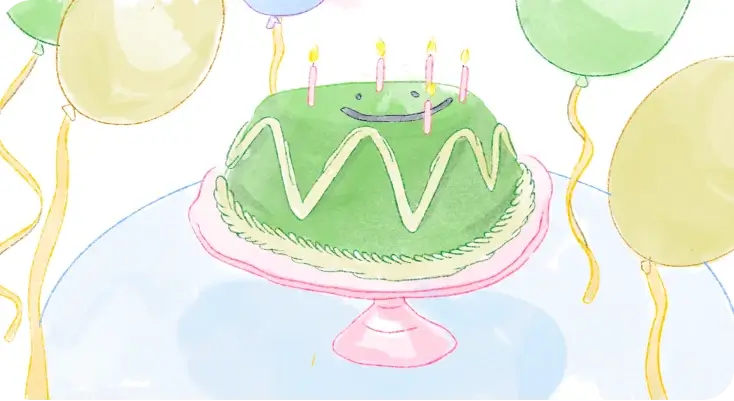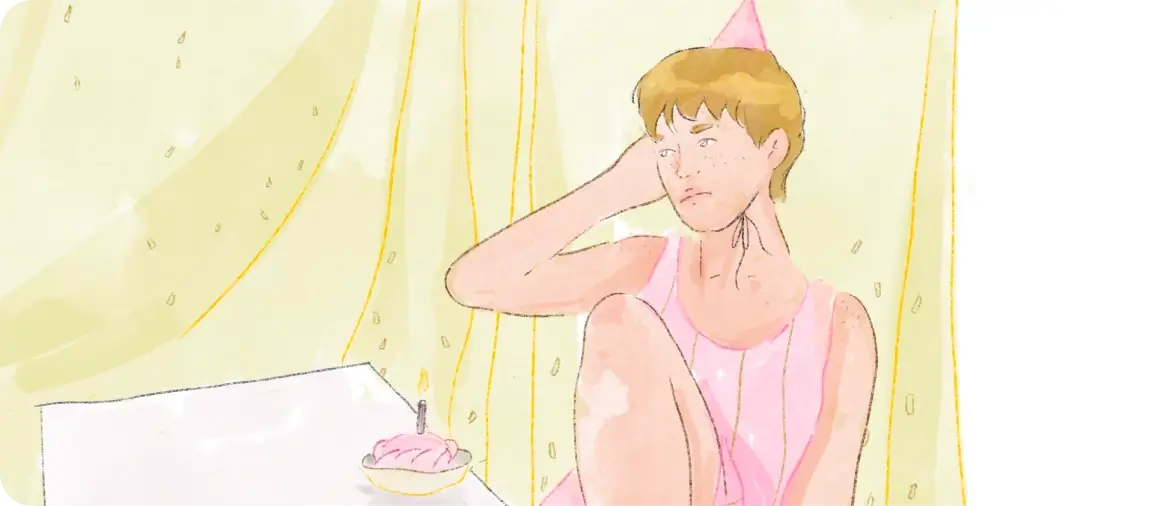What do you feel before and on your birthday? Happiness, celebratory vibes, desire to gather with your loved ones and make this day even brighter? If yes, you’re fortunate not to be familiar with birthday depression.
However, for many of us, this special day feels different. Frustrated, unmotivated, living with constant anxiety and sadness — this is how people experiencing birthday blues usually feel.
Imagine that you’re handling something heavy on your shoulders, and it drags you down as the special day approaches. Finally, you think, “I don’t want to celebrate my birthday anymore.”
But why does this happen? Why do you experience a mixture of sadness and emptiness, compounded by the pressure to feel happy? And why does every year only deepen these feelings? Let’s discover this together in the article.
Why Do I Cry On My Birthday? 4 Reasons
“The happiest day of the year,” isn’t it? While society expects us to be cheerful and delighted, some of us “celebrate” our birthdays in tears.
We don’t talk about late guests, a half-baked cake, or a canceled restaurant reservation. Life can throw curveballs, and everything may go wrong, but these are temporary problems.
Nevertheless, there can be something buried inside. Something that makes you think, “I hate my birthday,” even if everything seems OK at first sight. What can it be? We’ll try to understand.
1. Childhood Trauma
“Why am I so sad and depressed for no reason?” Well, let’s imagine this story.
As a child, Emma excitedly anticipated her birthdays. She would spend weeks crafting wish lists and imagining the joy of opening presents surrounded by friends and family.
But when she turned seven, everything changed. During her birthday celebration, a family argument erupted into chaos, further leading to her parents’ divorce.
Since then, this special day has become a sad reminder of fear and helplessness for her. With each passing year, she finds herself depressed on her birthday and feeling guilty.
As you can understand from this story, adverse childhood experiences can influence how we perceive birthdays.
If you had a parent who used to drink a lot of alcohol on every birthday, now you can perceive the celebration as “dangerous” and experience the trauma anniversary effect.
Any holiday may become a trigger that makes you stand at a crossroads. On one hand, everyone perceives it as a “joyful day.” On the other hand, you can find yourself crying on your birthday, trying to calm down your lost inner child.
How to understand that childhood experiences influence your mental health and/or well-being? With the Breeze test, you’ll gain personalized insights and answer the question, “Do I have trauma I don’t remember?”
2. Fear of Death
Many people are afraid of death or the process of dying because of the fear of the unknown. This phenomenon is called thanatophobia. Every year, as this scary date gets closer, they may feel sad on their birthdays, understanding its irreversibility.
Additionally, people can experience thanatophobia differently. Here are the most common manifestations.
- Worries about losing control. A desire to gain control over your life is normal. Still, in most cases, it’s impossible to control death. Because of this, many people feel frightened, which can lead to compulsive habits and constant anxiety.
- Fear of pain. Others who are scared of the dying process may be afraid of illnesses, the suffering they might endure, and the helplessness that can accompany severe health conditions.
- Dread about the loved ones. Last but not least. Some of us worry about people around us and experience birthday depression because of the understanding that everyone gets older.
These feelings are pretty common. About 41% of people experience thanatophobia.
So next time you ask yourself, “Why do I hate my birthday?”, consider whether you are dealing with this phenomenon. If you feel that this fear gets stronger and influences your quality of life, it might be a good idea to seek help from your healthcare provider.
3. Societal Pressure
Do you remember the story of Otis Milburn from Sex Education, a show on Netflix? As his birthday approached, he faced insecurities and felt pressure to meet expectations.
Consequently, he grappled with feelings of inadequacy regarding his identity. His birthday became a moment of self-reflection, pushing him to confront his fears and insecurities.
Similar to Otis, many of us face the unspoken question, “Why don’t I feel like myself?”
Figuring out who you are and how to live your life can feel like a challenging task. At the same time, if society starts pressuring you, it can get even more confusing.
“Why do I cry on my birthday?” Let’s try to remember the last time you’ve heard something like this at a festive table.
- “By now, you should have figured out your career path.”
- “When are you planning to settle down and start a family?”
- “It’s time to buy your own home and stop renting.”
- “Why aren’t you in a serious relationship yet?”
- “At your age, you should have achieved more.”
- “Why don’t you have kids yet? You’re not getting any younger.”
It can be difficult to feel happy about a new milestone when you’re grappling with uncertainty and external expectations, isn’t it?
4. Feeling of Loneliness
“I hate my birthday because no one cares!” This might be another serious reason that partially stems from the previous one.
We used to think that birthday celebrations were always about big parties, lots of air balloons, and a group of friends screaming “Surprise!” once you arrive home.
Another option is a cozy evening with family or a loved one where you get lots of presents and feel truly cherished and appreciated.
Although some people celebrate like this, some of us might be alone on birthdays. For example, if you are the middle child in the family, and your birthday wasn’t a thing.
You could have moved to another country, experienced a recent breakup, or had an argument, or maybe you’re a highly sensitive person who doesn’t like loud parties. All these things influence how we feel.
Is birthday depression a thing? Definitely, yes!
And if you feel lonely, detached, or frustrated on your special day, it might be reasonable to find a support group or get in touch with people who can give you a helping hand. Sometimes, simply talking to someone who understands can make a significant difference.

What is Birthday Depression?
The Diagnostic and Statistical Manual of Mental Disorders (DSM-5) doesn’t recognize birthday and pre-birthday depression as mental health conditions.
Nevertheless, feeling down on your birthday or over about a month before is actually common.
This can happen because we might perceive our birthdays as the beginning of a new stage of life. Intentionally or unintentionally, we may start reviewing our achievements, mistakes, and missed opportunities.
Thus, many people might start feeling sad about getting older or about the things they haven’t completed over a year.
Enna Sanghvi, MA, comments, “A birthday is a significant event in one’s life; similar to getting married, or losing a loved one. The emotional value attached to significant life events varies across people, cultures, upbringing, and innumerable other factors. There is no right or wrong way to feel about it.”
Depression around birthdays can get even tougher to handle when everyone around expects you to be joyful and excited. As a result, if you decide to organize a celebration despite your reservations, feeling disconnected from the festivities, like you’re watching from the sidelines while everyone else enjoys themselves, is common.
Further in the article, we’ll discover why you may feel sad and lonely on this special day. However, birthday depression can be associated with common mental health conditions like depression or anxiety disorder.
If you feel down, frustrated, or worried most of the time, and these emotions get even stronger before your birthday, it may be reasonable to contact a therapist. Take a free test from Breeze to get insights into your well-being, and consider seeking professional help if necessary.
Feelings Associated with Birthday Blues
Birthday sadness can be different. Here are some of the most common feelings you may experience:
- low energy and mood
- apathy and feeling unmotivated
- difficulty focusing or concentrating
- constantly thinking about the past
- feeling guilty about missed opportunities
- loneliness or a desire to isolate from others
- birthday anxiety
- self-loathing
So, next time you face the question when your birthday is just around the corner, “Why am I so emotional lately?”, maybe it’s because you start unconsciously worrying about this milestone and feel pressure on your shoulders.
And we have to say that this feeling is entirely OK.
Let’s look at one of the birthday depression quotes from a Reddit user, “You get older, and you feel like you have not accomplished anything, and you seem to have wasted a year’s worth of time…” Isn’t it sad that many people experience this almost every year?
Besides, when understanding the reasons why you experience depression on your birthday, there’s always room for change.
I Don’t Want to Celebrate My Birthday Anymore. What to Do?
Feeling sad about getting older is OK. You don’t need to be cherished and happy 24/7. Moreover, you can experience any emotion connected with your birthday.
Sometimes, instead of asking yourself, “Why do I always cry on my birthday?”, it may be reasonable to ask, “What’s next?” Let us give you a few tips.
- Appreciate your feelings. Low energy, stress about the past or future, and mood fluctuations are normal. Being kind to yourself in this challenging time is the best way to navigate it and ensure your emotional well-being.
- Analyze why you experience birthday blues. Spend time to find the answer to “Why do I feel empty or frustrated?” We’ve provided the most possible reasons, so it’s time to look inside and find the ones that resonate with your experience.
- Do whatever feels right for you. Do you want to spend the whole day watching TV series and eating sushi? Or do you want to buy a ticket to your dream destination spontaneously? Celebrations can be different. It’s up to you to decide what to do on your birthday.
- Track how you feel. Birthday depression can overwhelm you even a month before the actual date. Tracking your mood can be a great idea that will help you understand what’s happening, notice the connection, and identify triggers that contribute to your emotional state.
This awareness can empower you to take proactive steps, manage your feelings, and make your birthday a more pleasant experience.
Enna Sanghvi, MA, adds, “You can engage in adaptive or maladaptive behaviors during life events that have a negative emotional value. Identifying what emotion(s) you associate with your birthday and understanding which maladaptive patterns and behaviors you engage in as a result of those emotions can be informative; using these details of your experience to redirect yourself towards using coping skills can be healthy and allow you to navigate better.”
Disclaimer
This article is for general informative and self-discovery purposes only. It should not replace expert guidance from professionals.
Any action you take in response to the information in this article, whether directly or indirectly, is solely your responsibility and is done at your own risk. Breeze content team and its mental health experts disclaim any liability, loss, or risk, personal, professional, or otherwise, which may result from the use and/or application of any content.
Always consult your doctor or other certified health practitioner with any medical questions or concerns
Breeze articles exclusively cite trusted sources, such as academic research institutions and medical associations, including research and studies from PubMed, ResearchGate, or similar databases. Examine our subject-matter editors and editorial process to see how we verify facts and maintain the accuracy, reliability, and trustworthiness of our material.
Was this article helpful?





